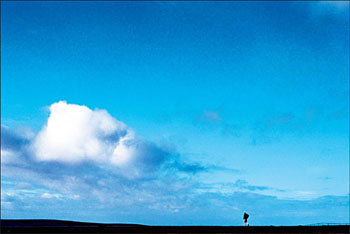| Tools: Save | Print | E-mail | Most Read |
| The Big Picture |
| Adjust font size: |
The 100 exhibited portrait photos, selected by a panel of experts from Deng's voluminous portfolio from the past three decades, have been donated to China's top art museum. Shot in the style of Rembrandt and using classical lighting and color effects, Deng portrays the personalities and life stories of people in every photo. The result is a universe of images that lingers in viewers' minds. The list of big names whose portraits appear in the exhibition includes Chinese scholar Qian Zhongshu, late Israeli Prime Minister Yizhak Rabin, Chinese-American physicist and Nobel Prize winner C.N. Yang, Canadian photographer Yousuf Kaarsh, Norwegian explorer Liv Arnnesen and Zambian lawyer M. Chona. Also featured are ordinary people such as a New York City teenager, a Tibetan grandmother and a Chinese soldier. "I have traveled afar to capture people in different parts of the world. Now I would like to share with people in the motherland the world that I've seen," Deng said at the opening ceremony for the show, which ended on April 26. "This donation and exhibition does not mark an ending but rather, a new start for my career," Deng said. He said that he kept for himself only about 300 photos that he believes are well-done, and he destroyed three rolls of negatives he considered flawed right before the exhibition's opening.
Over the last few decades, the photographer "has accomplished a mission that many of us considered impossible," said Feng Yuan, vice-chair of All China Federation of the Arts and Literary Circles and former director of the museum. It was Feng who asked Deng to donate his photos about three years ago. And "his fruitful efforts would do so much to enhance mutual understanding among Chinese people and people from around the world," Feng said. But Deng calls himself "simply a man who fulfilled his dreams". Born in 1959 in Beijing, Deng cherished a deep love for art - especially drawing and painting - from an early age. At 15, he seized an opportunity to learn from master Chinese landscape painter Li Keran. And during his university years, Deng rubbed shoulders with a variety of influential cultural figures in China, thanks to the endorsement of his father Deng Yuwen, a scholar of ancient Chinese literature. But Deng didn't begin to learn photography until 1978, when he became a classmate of Zhang Yimou, Chen Kaige, Gu Changwei and Tian Zhuangzhuang. After graduation, these talents garnered world reputations as key members of the "Fifth Generation" of Chinese film directors. "Although I majored in filmmaking and have done several prize-winning works for film and television, I have found that photography fits me best, because this career allows me to better comprehend the realities of life," Deng said. After graduating in 1982, Deng stayed on at the university for several years as a teacher. However, "with each passing day, I grew tired of the routine and predictable life that laid ahead. I hoped I could do something bigger and more exciting," Deng recalled. In 1990, he left his post and embarked on a difficult journey to photograph world-eminent figures. But he had to spend a long time laying the foundations for this dream career. He knew that he would have to familiarize himself with the lighting conditions he would encounter, as well as the characters of his subjects. So, he read everything he could get his hands on about his subjects in order to effectively capture their essences during the short time periods he was allowed for each shoot. At the encouragement of his father, Deng transformed a years-long project into an album entitled A Photographic Record of Eminent Cultural Figures of China in 1986. The project fuelled his zeal for photography and sealed his lifetime commitment to the trade. He decided then and there that the path of a filmmaker was not the road for him. The album was a hit at home and abroad, and many took it as a sign that Chinese intellectuals had regained their positions of social esteem after a period of humiliation during the "cultural revolution" (1966-76), Deng recalled. After the album's publication, Deng cast his eyes on world-eminent figures he knew only through TV news and newspaper reports. Since 1991, Deng has visited and photographed more than 100 famous figures traveling in Asia, North America and Europe. "There are still more world eminent figures that I want to take photos of," Deng said, citing such names as Vladimir Putin and Fidel Castro. But he also planned to shoot a series of portraits of master Chinese craftsmen, whom he considers torchbearers of many of the nation's vanishing forms of cultural heritage. "These people may not be known to people outside of their villages. But they have also made contributions to our cultures, and deserve my respect and photographic depiction," Deng said. (China Daily May 8, 2007) |
| Tools: Save | Print | E-mail | Most Read |
 |
| Related Stories |
|

